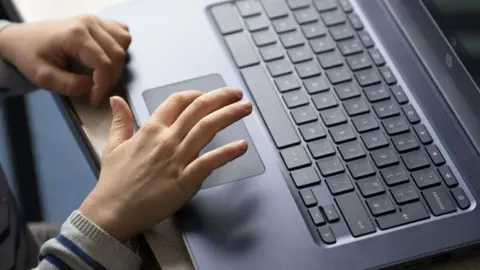Covid-19: Williamson promises 300,000 extra laptops
 PA Media
PA MediaAn extra 300,000 laptops and tablets have been bought to help disadvantaged children in England learn at home, says Education Secretary Gavin Williamson.
Mr Williamson said the devices would be delivered to schools.
He also pledged to publish a remote education framework to support schools and colleges with delivering lessons during the latest national lockdown.
It comes as research says children from poorer families are likely to struggle more with remote learning.
The Department for Education said its data showed that over 700,000 devices had been delivered to schools in England so far during the pandemic - 100,000 of which were delivered last week.
The department says the additional 300,000 laptops and tablets lifts government investment by another £100m, meaning over £400m will have been invested in supporting disadvantaged children who need help with access to technology during the pandemic.
But the department has faced mounting criticism over huge percentages of pupils not having access to digital devices, nine months into the pandemic.
Mr Williamson said the DfE was "doing everything in our power to support schools with high-quality remote education".
He said: "These additional devices, on top of the 100,000 delivered last week, add to the significant support we are making available to help schools deliver high-quality online learning, as we know they have been doing."
On top of this, the remote education framework would support schools and colleges with delivering education for pupils who are learning from home, he said.
The frameworks, which are voluntary and should be adapted for schools' individual circumstances, will "help them to identify the strengths and areas for improvement in the lessons and teaching they provide remotely".
But Geoff Barton, head of the Association of School and College Leaders, said: "While we welcome the extra laptops and tablets announced, it is pretty poor that nearly a year after this crisis began we are only now inching up to the number of devices that are needed.
"The reality is that this extra provision is coming when we are already well into the new lockdown and after a heavily disrupted autumn term in which many children had to self-isolate in line with coronavirus protocols," he said.
"The government was slow off the mark to address the digital divide early in the crisis and is now trying to make up for lost time."
Disadvantaged families
Mr Williamson's laptop announcement comes as research by the University of Sussex found that nearly one in five less advantaged parents said they struggled with home-learning during the first lockdown.
The research surveyed 3,409 parents in the UK between 5 May until 31 July last year and found families of lower socioeconomic status were more likely to report their home environment made it harder for pupils to complete schoolwork from home.
The study says secondary school pupils eligible for free school meals (39%) were more likely to report that a lack of technology - such as laptops and computers - made learning from home more difficult, compared to 19% of pupils who are not eligible for free school meals.
 Getty Images
Getty ImagesPrimary school pupils from struggling households were found to be more likely to find home learning learning harder than their more comfortable off peers due to the environment - such as noise levels (59% to 50%), lack of space (45% to 22%), lack of technology (45% to 26%) and lack of internet (35% to 16%).
The researchers warned that educational inequalities were likely to increase due to further school closures this year.
Lead researcher Dr Matthew Easterbrook said: "These results show that school closures disproportionately disrupt the education of those who are most economically disadvantaged, suggesting that educational inequalities are likely to rise because of the pandemic.
"The results show that parents of pupils from disadvantaged families - those who are eligible for free school meals, who have lower levels of education, or who are financially struggling - are much more likely to report that learning from home is challenging."
Report co-author Lewis Doyle, doctoral researcher at the University of Sussex, added: "School closures, while clearly necessary during this public health crisis, risk entrenching inequality."
School attendance figures
On Tuesday the government also published figures on how many pupils were physically in schools across England before the Christmas holidays.
The data shows 79% of pupils in state schools were in class on Wednesday16 December - down from 85% on Thursday 10 December.
In secondary schools, attendance fell from 80% to 72% on 16 December, while pupil attendance in primary schools fell from 89% to 86%, the figures show.
Between 9% and 11% of pupils - up to 872,000 children - did not attend school for Covid-19 related reasons on 16 December.
